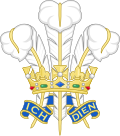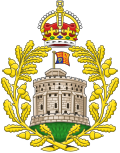Heraldic badge

A heraldic badge is not a part of an armiger's achievement of arms, but it is granted by the same body.
The badge is designed to be used by the supporters of an armiger. A mediaeval knight would be granted arms by letter patent, but his supporters or followers would not be allowed to display that achievement, instead they would use a badge to help identify themselves to each other and to other people.
Today, many English towns and cities have an achievement of arms. Usually the mayor and council are the only ones allowed to used the full coat of arms. The departments of the council use a badge, and it is the badge which is painted on council vehicles etc. to identify them.
Badges, like the arms, can only be used with the permission of the person to whom they were granted.
The "Prince of Wales's Feathers" is the badge of the heir apparent of the British monarch. The badge is used because the coats of arms of the prince and the monarch are very similar.
+{{{1}}}−{{{2}}}
Heraldic Badge Media
The Prince of Wales's feathers, which is the badge of the Prince of Wales as heir apparent to the crown of the United Kingdom.
Standard of Henry Stafford, 2nd Duke of Buckingham, about 1475, features the Stafford knot and Bohun swan badges.
The Dunstable Swan Jewel, based on a livery badge of about 1400 AD, perhaps of Henry V as Prince of Wales. British Museum
The Tudor Rose badge of the House of Tudor.
The Château de Blois, with the porcupine of Louis XII
Salamander badge of King Francis I of France, with letter "F", Château de Chambord
Modern badge of the House of Windsor









